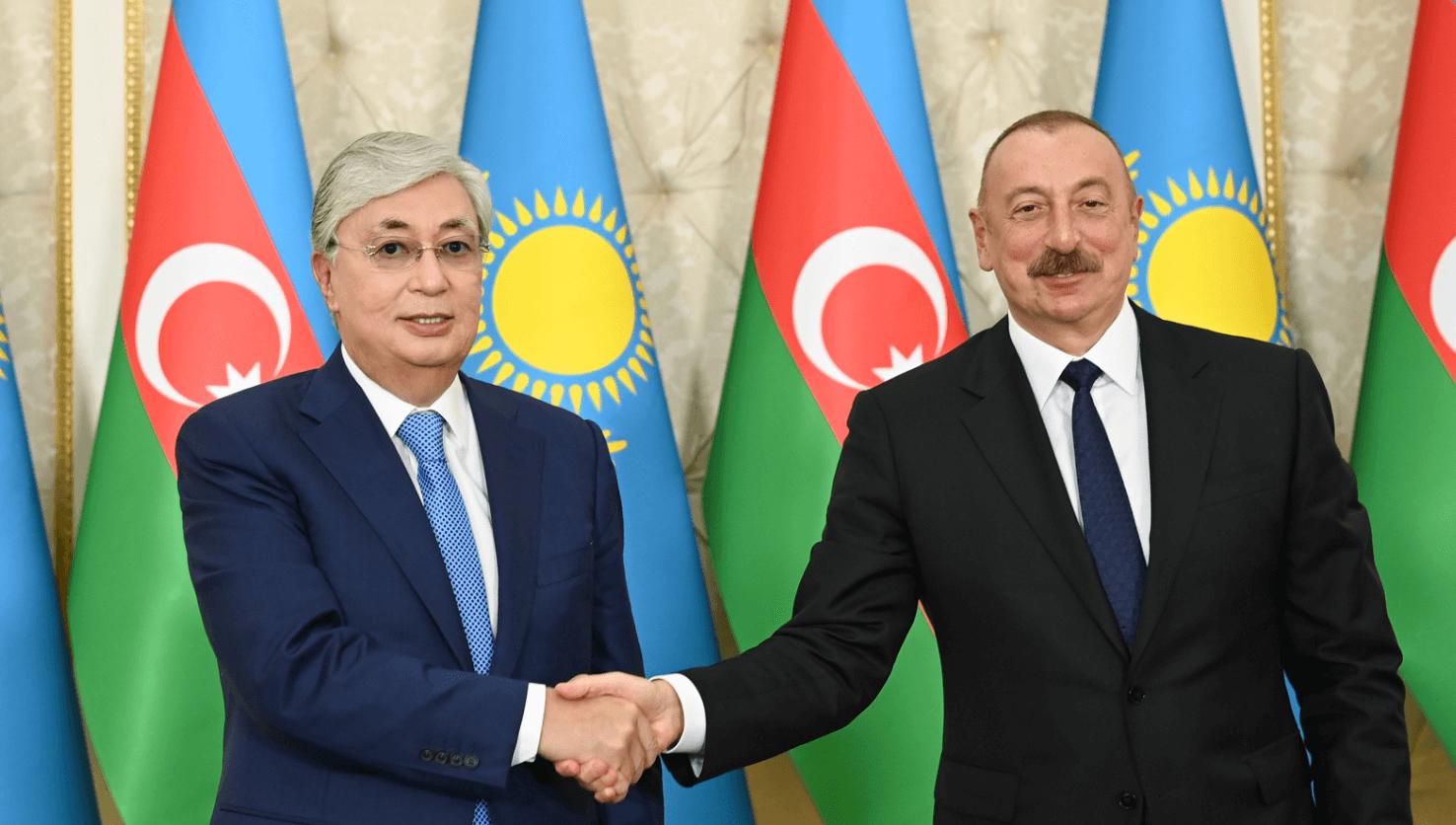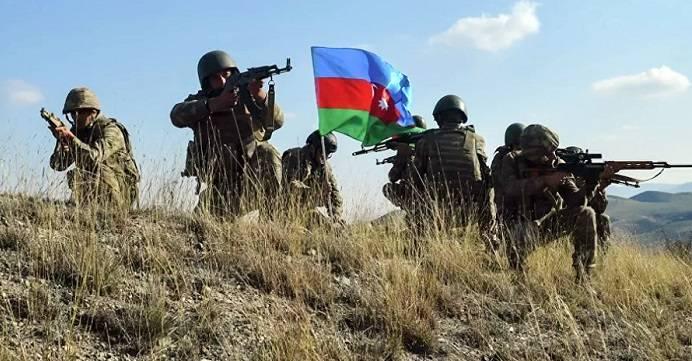Pundit: Kazakhstan should study Azerbaijan's military experience Caliber.Az interview with Zhaksylyk Sabitov
Kazakhstan and Azerbaijan have many promising areas of cooperation and overall great potential for the development of bilateral relations. This concerns literally all spheres of life - trade and economic, humanitarian, transport, cultural, scientific, analytical, and others. This conclusion was reached by both Azerbaijani and Kazakhstani experts based on a comprehensive analysis of the economic, political, and social situation in the two countries. From this point of view, the visit of Kazakh President Kassym-Jomart Tokayev to Azerbaijan can be rightfully considered historic, because it gave a powerful impetus to the mutually beneficial convergence of the two brotherly Turkic peoples.
Caliber.Az asked Kazakh political scientist Zhaksylyk Sabitov to share his views on the results of the visit and the prospects of cooperation between the two countries.

- After Azerbaijani President Ilham Aliyev and Kazakh President Kassym-Jomart Tokayev recently met in Baku in an enlarged format, the two countries signed a number of documents on cooperation. How do you generally assess the results of the visit of your head of state to Azerbaijan?
- When we talk about the results of these or other meetings, it should be noted that we can only see the tip of the iceberg, 3-4% of its mass. Few can know about all signed agreements in detail. Therefore, we are left to judge everything by the press releases, which are often not detailed and contain a lot of "ritual language". For this reason, we are forced to judge on the basis of an "asymmetry of information". It is also worth noting that presidents, when signing bilateral agreements, often simply "notarise" the outcome of the work of the two countries' agencies. During such meetings, the work of civil servants of the two countries is formalised. So, this necessary "notarisation ritual" and what was announced as a result of the meeting allows us to assess the action itself as a fruitful meeting of the two presidents that will strengthen cooperation between the two countries.
- In your opinion, how significant is the potential of the Azerbaijan-Kazakhstan tandem?
- The potential is certainly great, given the positive transport and logistics, economic and scientific-cultural agenda. If we examine Azerbaijan-Kazakhstan relations, we can see that there are no sharp corners and harsh contradictions between the national interests of the two countries. On the contrary, the vectors of national interests coincide on a number of issues. Based on this, we can speak of the high potential of Azerbaijani-Kazakhstani relations.
- In what areas do you think our countries should increase cooperation?
- First, of course, these are transport and logistics options for delivering energy from Kazakhstan to consumers. Here, of course, there must be strict economic calculations and a good analysis of the political development of the post-Soviet space over the next few decades. Kazakhstan is very dependent on Russia for energy transportation. The chain of events of 2022 showed that this route is too vulnerable to all sorts of political circumstances, so Kazakhstan should think of a "back way out" that could be an alternative in a situation where the country is highly dependent on one international actor.
Secondly, Kazakhstan and Azerbaijan should develop scientific and cultural cooperation, which would enable a much deeper study of common elements of our history and culture. We have a number of organizations for this purpose. For instance, the Turkic Academy. It is quite possible that we should think about expanding its staff, as well as about new joint scientific projects. For example, Russia used to publish a series of books, Peoples and Cultures, each volume of which described the history and culture of one of the post-Soviet peoples. However, the individual volumes contained large errors in the interpretation of history; entire eras were sometimes presented in a truncated form, which created a distorted picture of the history of this or that nation. In that connection, I think the Turkic academy should launch its scientific cycle 'Turkic peoples', wherein each volume should present the history of one of the Turkic nations. The whole cycle should describe all extant Turkic peoples.
Thirdly, Kazakhstan should study Azerbaijan's military experience regarding Karabakh. This is a new type of war that Kazakhstan must master, as all developed and developing countries of the world do, which want to ensure a certain level of national security.

- Recently there has been an impression that Kazakhstan wants to move away from Russia, in particular from its EAEU and CSTO allies. Has such a trend really surfaced in Kazakhstan and is the configuration of Russian-Kazakh relations really changing?
- On the one hand, Kazakhstan, due to the considerable weight of geographical and geopolitical factors, will not move away from Russia. The enormous border between the two countries has condemned both countries to a high level of good neighbourliness. An attempt to change the status quo would have negative consequences for both countries. In Kazakhstan, on the other hand, there is a rise in well-founded skepticism towards the EEU. This is due not so much to the sentiments of the population, but to the fact that Kazakhstan lost out in negotiations on many positions during the era of Nursultan Nazarbayev. If we take the pre-war distribution of customs duties among the EAEU countries, it turns out that Kazakhstan feeds Belarus and other EAEU countries in this regard. It would be fair to divide these customs duties according to the ratio of GDP of each country to the total GDP of the EAEU, but in fact, it turns out that Kazakhstan received the most unfair distribution of customs duties of all EAEU countries. And given the sanctions and a number of other factors, it can be argued that this disparity will only increase. And this is just one point of unfair rules for Kazakhstan in the EAEU. Therefore, Nur-Sultan must begin to assert its economic interests much more firmly at the negotiating table, including with other EAEU countries, which have received their disproportionate preferences precisely at the expense of their own negotiators.
- Is it possible, without quarreling with Russia, to take the position, in which Kazakhstan will strengthen its relations with the West as well?
- Kazakhstan is acting in such a way now. The country distances itself as much as possible from the conflict (meaning the Russian-Ukrainian conflict - ed.), taking a neutral position. Of course, for humanitarian reasons, Kazakhstan could have adhered to a more internationally endorsed attitude to the situation, but based on national interests and geopolitical position, it is more rational to choose our current position in the field of international relations.
Speaking about the national interests of Kazakhstan, here, in my opinion, it is possible to single out two main pillars that our political elite is guided by. The first is the preservation of the country's territorial integrity at this difficult time when the norms of international law have ceased to work. The second is economic growth in the country by fighting nepotism and corruption and by building a fair economy, in which oligarchs and the rich should be as equal before the law as ordinary citizens. During the Nazarbayev era, the entire economic system operated in the interests of the oligarchs and the upper stratum of our society (low taxes are evidenced by one of the worst budget-to-GDP ratios in the post-Soviet space), while other segments of society were condemned to poor quality of life and under-received their share of the dividends from the country's economy.








